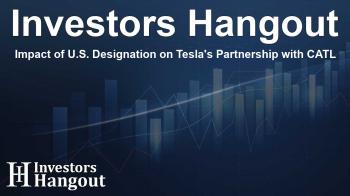Impact of U.S. Designation on Tesla's Partnership with CATL

Understanding the U.S. Designation of CATL and Its Effects
The recent designation of CATL by Washington as a company associated with China's military could have significant implications for Tesla and its founder Elon Musk. As a major player in the electric vehicle (EV) market, knowing how this situation unfolds becomes crucial.
CATL: A Key Partner for Tesla
CATL, known as the largest battery manufacturer in the world, supplies the lithium iron phosphate (LFP) batteries necessary for Tesla's vehicle production at its Shanghai factory. As Tesla's largest production site, the smooth operation and supply of batteries from CATL are essential for Tesla's manufacturing and delivery goals across various markets, including Europe and Canada.
Concerns Regarding Security
Lawmakers have raised alarms about CATL's battery storage initiatives within the United States, claiming that these could pose potential security risks. As it stands, approximately 4% of CATL's EV batteries and 35% of its electric storage systems are linked to the U.S. market, underlining the firm’s involvement in the American energy landscape, based on estimates from several analysts.
The Designation's Ramifications
The U.S. Department of Defense's relation of CATL with military associations does not impose immediate restrictions on the firm; however, it does tarnish the reputations of the involved companies and sends warning signals to U.S. entities contemplating partnerships. Furthermore, the Department of Treasury may face pressure to impose sanctions on these enterprises.
Future Collaboration on Battery Production
In light of the situation, Tesla and CATL are advancing discussions about a licensing agreement for battery production technology within Nevada, with intentions to set this up by 2025. Additionally, CATL is anticipated to supply cells and packs for Tesla's Megapack energy storage product at the Shanghai plant, enhancing their cooperation as demand for Megapack ramps up.
Potential Outcomes for Tesla
Analysts like Seth Goldstein from Morningstar express that while there are no immediate repercussions for Tesla, the idea of being removed from military contracts might influence other potential partners' perspectives on working with CATL. This hesitation could indeed complicate Tesla’s strategy in maintaining robust ties with CATL while navigating the complex geopolitical landscape.
Looking Back at Previous Moves
In the past, pressures from legislators prompted U.S. utility companies, such as Duke Energy, to phase out CATL products due to concerns over national security from using Chinese-made batteries. Such trends indicate a broader scrutiny that could affect Tesla if CATL's associations are viewed unfavorably.
Political Dynamics and Tesla's Future
Despite the external pressures, analysts believe that Tesla is likely to preserve its partnership with CATL due to the essential nature of these ties with the Chinese government, which they consider crucial for future business success. Disrupting these relationships may pose significant risks that outweigh any potential U.S. political ramifications.
Legal Framework Affecting Contracts
The recent legislation, particularly the 2024 defense authorization act, introduces restrictions that might prevent federal contracting with companies on the Pentagon's list of Chinese Military Companies. This new legal environment could pose hurdles for any future engagements involving CATL.
CATL's Response and Future Ambitions
CATL's reaction to the U.S. designation has been one of contention, arguing that they do not participate in any military-related operations. Furthermore, the company is actively exploring options for building a manufacturing facility in the U.S., particularly if the political climate allows for more favorable conditions surrounding Chinese investments in critical sectors, like the EV supply chain.
The Broader Implications for the Industry
The ramifications of the designation extend beyond Tesla and CATL; they are part of a larger story involving national strategy and economic competition. As electric vehicles gain traction around the globe, the partnerships that companies forge will significantly affect how the industry evolves. Tesla, equipped with invaluable insights from its collaborations, can retain a competitive edge in this fast-changing environment.
Frequently Asked Questions
What is the significance of the U.S. designation of CATL?
The designation links CATL to China's military, which may raise concerns for companies considering partnerships with them, including Tesla.
How does this designation affect Tesla's operations?
Currently, there are no immediate impacts, but it may influence potential partnerships and the perception of CATL's reputation in the U.S. market.
What role does CATL play in Tesla's business?
CATL supplies batteries for Tesla's Shanghai factory, which is critical for the production of vehicles and energy storage products.
Are there legislative changes that could affect these companies?
Yes, upcoming legislation could restrict federal contracts with companies on the Pentagon's list of Chinese Military Companies, posing challenges for CATL and Tesla.
What are CATL's future plans in the U.S.?
CATL is considering building a manufacturing facility in the U.S. if favorable investment conditions develop under future U.S. administrations.
About The Author
Contact Addison Perry privately here. Or send an email with ATTN: Addison Perry as the subject to contact@investorshangout.com.
About Investors Hangout
Investors Hangout is a leading online stock forum for financial discussion and learning, offering a wide range of free tools and resources. It draws in traders of all levels, who exchange market knowledge, investigate trading tactics, and keep an eye on industry developments in real time. Featuring financial articles, stock message boards, quotes, charts, company profiles, and live news updates. Through cooperative learning and a wealth of informational resources, it helps users from novices creating their first portfolios to experts honing their techniques. Join Investors Hangout today: https://investorshangout.com/
The content of this article is based on factual, publicly available information and does not represent legal, financial, or investment advice. Investors Hangout does not offer financial advice, and the author is not a licensed financial advisor. Consult a qualified advisor before making any financial or investment decisions based on this article. This article should not be considered advice to purchase, sell, or hold any securities or other investments. If any of the material provided here is inaccurate, please contact us for corrections.

